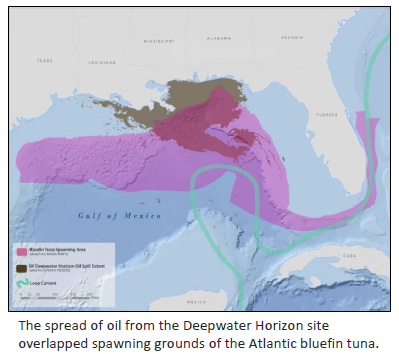Potential Threats to Marine Life from Deepwater Horizon Oil Spill
For decades, surface longlines posed a threat to ocean wildlife in the Gulf of Mexico. This indiscriminate fishing gear catches and kills approximately 80 species of non-target animals. In 2010, the worst offshore oil spill in U.S. history exacerbated the negative environmental impacts of wasteful surface longlines and created its own set of challenges for Gulf wildlife.
Oiled Fish Habitat
- The Deepwater Horizon incident occurred in the western Atlantic bluefin tuna's only known spawning ground and lasted through the peak of its breeding season.
- The temporal and spatial extents of the spill also coincided with blue and white marlin and sailfish spawning.
Harmful Interactions with Fish
- Because adult bluefin tuna spawn at the ocean's surface and the eggs and larvae remain at the surface, these three life stages were likely exposed to both the slick and dispersants released as part of the remediation efforts.
- The dispersants deployed in the Gulf following the spill may also adversely affect finfish. Eggs are particularly vulnerable since they have oil droplets, and the dispersants are designed to target and break down oil.
- Oil has been shown to be toxic to fish hearts and circulatory systems, especially in larvae.
- Tunas, billfish, and sharks must swim constantly to obtain oxygen. Oiled fins and gills may compromise locomotion and impair respiration.
- External exposure to oil can lead to skin lesions.
- Fish may ingest oil while feeding, which can damage their digestive system.
Additional Impacts to Depleted Gulf Marine Life
- Oil exposure is harmful to all life stages of sea turtles, all species of which are endangered or threatened. Impacts include increased egg mortality, developmental defects, direct mortality, and harm to the skin, blood, salt glands, and digestive and immune systems.
- The Gulf of Mexico provides essential fish habitat for several shark species, such as scalloped hammerhead and dusky sharks, during all life stages.
A Possible Solution
Surprisingly, out of this Deepwater Horizon catastrophe comes a potential way to help solve the bycatch problem caused by surface longlines. Oil spill restoration money could help pay for a gear transition program. Switching from surface longlines to selective fishing gears could protect rare and depleted ocean wildlife while keeping fishermen in business.












